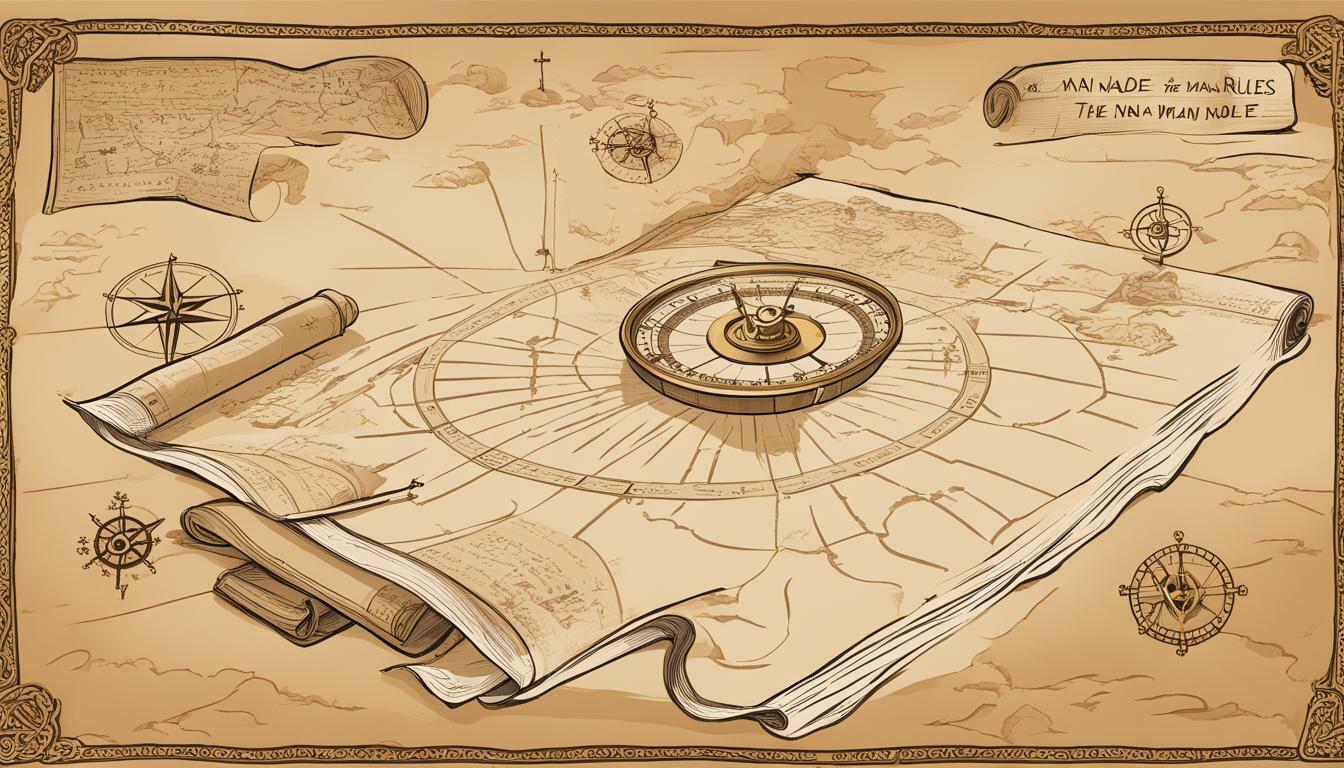As believers, we often encounter human-made rules and regulations in our daily lives. But what does the Bible say about these laws? Should we follow them blindly, or is there a deeper understanding of their place in our lives?
According to the Bible, man-made rules and regulations are not inherently wrong, but they must be viewed in light of God’s divine authority. As we explore the biblical view on man-made rules, we will gain a deeper understanding of how to navigate these earthly regulations.
Key Takeaways:
- The Bible emphasizes the importance of understanding God’s authority over man-made rules.
- Believers must exercise discernment when navigating human laws that contradict God’s principles.
- Jesus warns against legalism and rigid adherence to man-made rules.
- By seeking God’s wisdom and guidance, we can apply biblical principles to man-made rules in a way that honors Him.
Understanding the Authority of God’s Word
Before we delve deeper into the topic of man-made rules, it is essential to establish the authority of God’s Word. The Bible is the primary source of guidance for believers, and God’s perspective on man-made rules is clear in scripture.
Psalm 119:105 states, “Your word is a lamp to my feet and a light to my path,” emphasizing the importance of God’s instructions in our lives. Additionally, Proverbs 30:5-6 declares, “Every word of God proves true…Do not add to his words, lest he rebuke you and you be found a liar.”
“Every word of God proves true…Do not add to his words, lest he rebuke you and you be found a liar.”
These verses highlight the authority and trustworthiness of God’s Word. As believers, it is crucial to prioritize His teachings over human interpretations and regulations.
While human laws can serve a practical purpose, they are subject to errors and biases. The Bible reminds us that only God’s Word is perfect and infallible, and we should rely on it for our guidance and direction.
The Dangers of Man-Made Regulations
The Bible teaches us to be cautious about blindly following man-made regulations. While such laws may seem beneficial on the surface, they can lead us down a dangerous path if we prioritize them over God’s Word.
Jesus himself criticized the Pharisees for their strict adherence to man-made rules, saying, “They tie up heavy, cumbersome loads and put them on other people’s shoulders, but they themselves are not willing to lift a finger to move them” (Matthew 23:4, NIV).
“So you also, when you obeyed the commandment of man, were in bondage. But when the commandment of God came to you, you were free from that bondage.” – Galatians 4:9 (WEB)
Additionally, the Bible warns us against taking pride in our adherence to man-made regulations, stating, “These rules, which have to do with things that are all destined to perish with use, are based on merely human commands and teachings. Such regulations indeed have an appearance of wisdom, with their self-imposed worship, their false humility and their harsh treatment of the body, but they lack any value in restraining sensual indulgence” (Colossians 2:22-23, NIV).
It is important to remember that our ultimate allegiance should always be to God’s Word and His divine principles. While human laws may have some merit, they should never supersede God’s commands.
The Balance of Obedience to Human Authorities
As Christians, we are called to respect and obey human authorities, but not at the expense of disobeying God. However, this can be a delicate balance to maintain. The Bible teaches that human authorities are established by God and should be respected and honored.
Romans 13:1-2 says, “Let every person be subject to the governing authorities. For there is no authority except from God, and those that exist have been instituted by God. Therefore whoever resists the authorities resists what God has appointed, and those who resist will incur judgment.”
It is important to note that this does not mean blind obedience to every law or rule that human authorities put in place. We must weigh these regulations against God’s Word and discern if they align with His principles.
At times, this may require civil disobedience when human laws go against God’s commands. For example, in Acts 5:27-29, the apostles were told by the authorities not to speak about Jesus. However, they chose to obey God rather than man and continued to preach the Gospel.
Ultimately, our obedience and submission to human authorities should be tempered by our commitment to God’s authority. When there is a conflict between the two, we must prioritize God’s Word and principles over human-made rules and regulations.
The Importance of Discernment
As we navigate man-made rules and regulations, it is essential to exercise discernment and sift through them according to biblical principles. The Bible teaches us to seek God’s perspective on man-made rules and regulations, and to follow them only when they align with His divine laws.
Proverbs 3:5-6 instructs us to trust in the Lord with all our hearts and lean not on our own understanding. In doing so, we acknowledge that God’s ways are higher than ours, and His guidance is essential in navigating human regulations.
Furthermore, 1 Thessalonians 5:21 advises us to test everything and hold on to what is good. This includes examining human-made rules and discerning whether they align with God’s Word or not. We must be careful not to blindly follow man-made laws that contradict His principles.
Ultimately, discernment requires seeking God’s wisdom through prayer and studying His Word. As we grow in our faith and knowledge of His truth, we can better navigate man-made rules and regulations in accordance with His will.
“Do not conform to the pattern of this world, but be transformed by the renewing of your mind. Then you will be able to test and approve what God’s will is–his good, pleasing and perfect will.” – Romans 12:2
The Contrast Between God’s Divine Laws and Man-Made Rules
When it comes to navigating man-made rules and regulations, it is essential to understand the contrast between God’s perfect laws and the limitations of human regulations. Scripture on man-made rules emphasizes the temporal nature of human laws, while highlighting the eternal and unchanging nature of God’s divine principles.
“The grass withers and the flowers fall, but the word of our God endures forever.” – Isaiah 40:8 (NIV)
The Bible teaches that God’s Word is the ultimate authority, and His divine laws are the foundation for all moral and ethical standards. In contrast, man-made rules are subject to interpretation and change, and they do not always align with God’s principles.
“You have let go of the commands of God and are holding on to human traditions.” – Mark 7:8 (NIV)
It is essential to recognize that human traditions and laws are fallible and can lead us astray from God’s perfect will. When faced with conflicting laws and regulations, we must seek guidance from God’s Word to discern His will and determine the right course of action.
“But if any of you lacks wisdom, let him ask of God, who gives to all generously and without reproach, and it will be given to him.” – James 1:5 (NASB)
By relying on God’s wisdom and guidance, we can navigate human regulations in a way that honors Him and seeks to live according to His divine principles. By recognizing the shortcomings of man-made rules and embracing the authority of God’s Word, we can find true freedom and fulfillment in our lives.
Jesus and the Pharisees: A Lesson on Legalism
The interactions between Jesus and the Pharisees provide valuable insights into the dangers of legalism and rigid adherence to man-made rules. Throughout the Gospels, we see the Pharisees questioning Jesus and trying to catch Him in violations of their laws. They criticized Jesus for healing on the Sabbath, associating with sinners, and not following their strict rituals.
“Woe to you, teachers of the law and Pharisees, you hypocrites! You give a tenth of your spices—mint, dill and cumin. But you have neglected the more important matters of the law—justice, mercy and faithfulness. You should have practiced the latter, without neglecting the former.” – Matthew 23:23 (NIV)
Jesus challenged their legalism and emphasized the importance of justice, mercy, and faithfulness over empty rituals and rules. He exposed their hypocrisy and reminded them that their man-made laws should not take precedence over God’s commandments.
“You have let go of the commands of God and are holding on to human traditions…. You have a fine way of setting aside the commands of God in order to observe your own traditions!” – Mark 7:8-9 (NIV)
Jesus’ teachings on legalism and man-made rules emphasize the importance of discernment and prioritizing the principles of God’s Word over human regulations.
The Role of Freedom and Conscience
While obedience to God’s commands must take precedence over man-made rules, the Bible also instructs believers to respect human authorities and the laws they establish. However, as we navigate through human regulations, we must exercise caution and discernment, lest we fall into legalism and bondage.
According to Romans 13:1, “Let every person be subject to the governing authorities. For there is no authority except from God, and those that exist have been instituted by God.” This verse emphasizes the divine guidance on human rules and the importance of submitting to earthly authorities.
However, we must also remain vigilant, as not all human laws align with God’s principles. In Acts 5:29, the apostles stated, “We must obey God rather than men.” This passage emphasizes the importance of prioritizing God’s authority over man-made regulations.
Divine guidance on human rules also involves exercising our freedom responsibly. Galatians 5:13 reminds us, “For you were called to freedom, brothers. Only do not use your freedom as an opportunity for the flesh, but through love serve one another.” Our freedom should never be an excuse for selfishness or disobedience.
Furthermore, our conscience should guide us as we navigate through human regulations. 1 Corinthians 8:7 states, “However, not all possess this knowledge. But some, through former association with idols, eat food as really offered to an idol, and their conscience, being weak, is defiled.” Our conscience should be sensitive to God’s leading and the principles of His Word.
“While obedience to God’s commands must take precedence over man-made rules, the Bible also instructs believers to respect human authorities and the laws they establish.”
Ultimately, divine guidance on human rules requires us to seek God’s wisdom and discernment. James 1:5 reminds us, “If any of you lacks wisdom, let him ask God, who gives generously to all without reproach, and it will be given him.” By relying on God’s guidance, we can navigate human regulations in a way that honors Him and seeks to live according to His divine principles.
So let us exercise our freedom responsibly, let our conscience guide us, and seek God’s wisdom and discernment as we navigate through human regulations. By following these principles, we can fulfill our duty as believers to respect human authorities and prioritize God’s authority in a world of man-made rules.
The Importance of Seeking God’s Wisdom and Guidance
When it comes to man-made rules, seeking God’s wisdom and guidance is crucial for navigating them in a way that honors Him. As believers, we should always prioritize God’s perspective on man-made rules, as His Word provides us with the ultimate authority and guidance.
“Trust in the Lord with all your heart and lean not on your own understanding; in all your ways submit to him, and he will make your paths straight.” – Proverbs 3:5-6
Proverbs 3:5-6 reminds us to trust in the Lord with all our hearts and to submit to Him in all our ways. This includes our approach to man-made rules and regulations, as we seek His wisdom and guidance in navigating them.
As we seek God’s guidance, we should also remember that His Word provides us with a biblical view on man-made rules. By studying the Bible and applying its principles to our lives, we can ensure that we are approaching human laws in a way that aligns with God’s perfect standards.
Ultimately, seeking God’s wisdom and guidance allows us to discern between man-made rules that align with God’s principles and those that contradict His Word. By relying on His divine guidance, we can navigate earthly regulations in a way that honors Him and seeks to live according to His will.
The Importance of Applying Biblical Principles to Man-Made Rules
As believers, we are called to adhere to God’s divine laws above all else. However, we also live in a world of man-made rules and regulations that we must navigate on a daily basis. How can we ensure that we honor God while also obeying earthly authorities?
The Bible offers valuable teachings on how to approach man-made rules in a way that aligns with God’s principles. Here are some biblical principles on human-made regulations that can help guide our actions:
- Honor God above all else: In Matthew 22:21, Jesus tells us to “render unto Caesar the things that are Caesar’s; and unto God the things that are God’s.” This teaches us that while we should respect human authorities, our ultimate allegiance is to God. We must ensure that our actions are in line with His will, even if it means going against human laws.
- Discernment is key: Proverbs 3:5-6 instructs us to “trust in the Lord with all your heart and lean not on your own understanding; in all your ways submit to him, and he will make your paths straight.” When it comes to man-made laws, we must rely on God’s wisdom and discernment to determine which regulations align with His principles and which do not.
- Be a law-abiding citizen: In Romans 13:1-2, we are reminded that “there is no authority except that which God has established. The authorities that exist have been established by God. Consequently, whoever rebels against the authority is rebelling against what God has instituted.” Therefore, as long as man-made laws do not contradict God’s commands, we should strive to obey them.
- Use freedom responsibly: Galatians 5:13 reminds us that “you, my brothers and sisters, were called to be free. But do not use your freedom to indulge the flesh; rather, serve one another humbly in love.” While we have freedom in Christ, we must also use it responsibly and considerately towards others.
Applying these biblical teachings on rules made by humans to our daily lives can help us navigate man-made regulations in a way that honors God. By seeking His wisdom and discernment, we can discern which laws align with His principles and which do not. We can also ensure that we are responsible citizens who use our freedom in a way that serves others.
The Importance of Embracing God’s Authority in a World of Man-Made Rules
As we have explored in this article, man-made rules and regulations can pose potential dangers and limitations, as they are often subject to human interpretation and fallibility. However, as believers, we are called to prioritize God’s authority over any earthly laws.
The Bible teaches us that all authority ultimately comes from God (Romans 13:1-2), and that His divine laws are above any human regulations. We are called to submit to human authorities and laws as long as they do not contradict God’s commands (Acts 5:29), but we must also discern between laws that align with God’s principles and those that do not.
In a world where man-made rules can vary greatly and often conflict with one another, it is vital for us to seek God’s wisdom and guidance. We can do this through prayer, studying His Word, and seeking counsel from other believers.
By embracing God’s authority and discerning His will, we can navigate man-made regulations in a way that honors Him and reflects His divine principles. We must remember that our ultimate goal as believers is to glorify God in all that we do, including obeying the laws of the land while remaining obedient to His commands.
In conclusion, while man-made rules and regulations are a fact of life, we as believers must prioritize God’s authority and discern His will when dealing with them. By relying on His wisdom and guidance, we can navigate earthly regulations in a way that reflects His love and grace. Let us seek to honor Him in all that we do, even in a world of constantly changing man-made rules.




